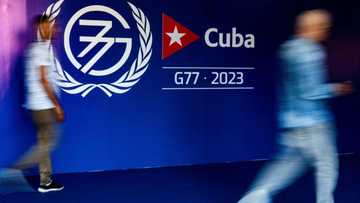The US sanctions squeezing Iran leaders, oil and trade

Source: AFP
Iran is one of the world's most sanctioned countries, with the United States deploying a punishing arsenal of measures against the Islamic republic since the Iran hostage crisis of 1979-81.
These are the main categories of sanctions in place:
Trade
In April 1980, mid-way through the 444-day hostage crisis at the US embassy in Tehran, Washington broke off diplomatic relations with Iran and imposed restrictions on commerce and travel.
Fifteen years later, then US president Bill Clinton announced a complete ban on trade and investment in Iran, accusing it of seeking to acquire nuclear weapons and supporting terrorism.
To this day nearly all US trade with Iran is banned, from oil to cars and carpets, with exceptions for food, medicine and humanitarian goods.
PAY ATTENTION: Share your outstanding story with our editors! Please reach us through info@corp.legit.ng!
Arms
The US continues to ban the trade of all weapons with Iran, three years after a UN arms embargo on the Islamic republic expired.
The UN embargo ran out under the terms of an international deal on curbing Iran's nuclear programme from which then US president Donald Trump unilaterally withdrew in 2018.
But the US continues to sanction any individual or entity -- in the US or elsewhere -- that trades weapons with Iran.
Finance
The US blocks Iranian government assets in the United States and bans US companies from engaging in business with Iran's central bank.
It also bans American banks from serving as intermediaries in the transfer of funds to Iran.
In 2018, the Trump administration expanded the sanctions to foreign institutions that do business with Iran's central bank, who risk losing access to the US financial system.
Oil
After having already banned oil exports to the United States, Washington in 1996 enacted a law also sanctioning foreign companies that invest in Iran's oil sector, the country's top foreign exchange earner.
In 2019, the US lifted exemptions that had allowed eight countries, including Turkey and India, to continue purchasing Iranian oil, causing a collapse in Iranian oil exports.
People
Iran's supreme leader Ayatollah Ali Khamenei is among a host of regime officials targeted by US asset freezes and bans on travel to the United States, along with senior commanders of the Islamic Revolutionary Guard Corps which has led crackdowns on pro-democracy protests.
President Joe Biden's administration has also sanctioned dozens of officials over a clampdown on nationwide protests that erupted over the death of Mahsa Amini, a young Iranian Kurd who died in custody in September 2022 after her arrest for an alleged breach of the Islamic republic's strict dress rules for women.
On Monday, the United States imposed new sanctions on Iran's intelligence ministry and former president Mahmoud Ahmadinejad as a prisoner swap was underway between the two foes.
They were imposed over the disappearance of Bob Levinson, a former FBI agent who disappeared in Iran in mysterious circumstance and is presumed dead.
Source: AFP



